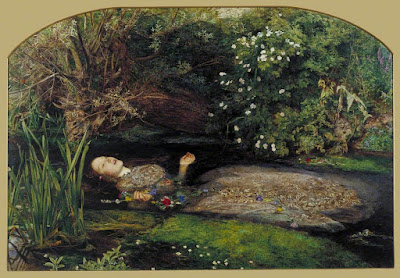Pushy Parents, Clothes and Climate Crisis
Pushy Parents and Private Schools
 |
Ophelia, John Everett Millais (1829-1896)
Photo Credit:Tate [CC BY-NC-ND]
|
Clarissa Farr, who retired from St Paul’s in 2017 after 11 years in charge, recalled parents angry that their daughter had got into the “wrong” Oxbridge college and one teenager so distraught at getting an A at GCSEs alongside a clean sweep of A*s that she was found face down on the floor.
The veteran head teacher’s book, The Making of Her, describes parents interfering as a result of their obsession with getting their children on a rung as far up the “league table ladder” as possible. She urges them to cling less to their children when they start secondary school and let them go.
She said that parents who were asked to take a back seat and allow their children to confront challenges often found it difficult to oblige.
“Surely it was up to them to know everything, to smooth away all the snowdrifts blocking their path? For us parents, this learning to let go is a lifelong counterintuitive lesson.”
She added: “Get used to the fact that you will not know everything…which means not expecting daily personal bulletins on progress but a relationship of trust where you would feel comfortable to be in touch if you had a genuine concern or worry.”
Pupils, equally, should also be guided into not rushing to involve parents in problems at school. She said.
…Speaking five years ago at a conference, Ms Farr said that parents of children at leading private schools were terrified of their children’s failure and how it would reflect on them.
She accused some high-achieving parents of “affluent neglect”, where children were not shown enough attention in the evenings, and others of showing “frenetic anxiety” or refusing to accept their child coming second. She warned that children were growing up unable to cope with failure.
…Despite St Paul’s academic rigour, Ms Farr condemned the “persistent adulation of academic success and snobbery”. That had served “both to encourage a divided society and entrench an over-simplistic view of what constitutes a good school”. She also decried politicians “reaching desperately for bits of old policy” saying that bringing back grammar schools, for example, was “no answer either”.
(The Times, 2019)
Ms Farr is experienced,
knowledgeable and shows good judgement. A wise woman.
*Sir, I was interested to read Clarissa Farr’s comments on “pushy parents” at St Paul’s Girls’ School (report, May 27). In a 30-year career as a teacher in independent education, I know what she means, both about parents who cannot accept second place and believe they are paying to avoid it, and about those who find it very difficult to let their children go, and seek to know every detail about everything they do – not just their academic work, but all their other activities too, including their social lives.
No one can or should be happy all the time, and parenting or schooling that strives to protect children from ever feeling disappointed, upset, angry or anxious is not good education.
Parents and schools should instead help young people to learn to manage their emotions when sad things happen, or they see injustice, or they have to face an experience that will be stressful, while academic learning should be valued for its enrichment of lives, not just its access to qualifications.
The type of parenting of which Ms Farr writes is contributing to the rise in mental health issues in our young people just as much as the social media we so often hear blamed.
(Rachel Dowdney, Brough, E Yorks, The Times, 2019)
Clothes
Cotton is a thirsty crop, draining water resources, while polyester made from oil-based polymers has twice its carbon footprint. Deforestation caused by clearing land for clothing fibre production risks accelerating global heating. To protect the planet we should be spinning out quality clothes for longer, not constantly chasing the new, yet the rise and rise of Primark suggests a gap between what people say and what they actually do.
“There has been a lot of justifiably bad publicity about ethical sourcing, paying people a pittance and all that,” says the retail analyst Richard Hyman, a former director of the retail intelligence company Mintel. “But I’m afraid the truth is that comfortable middle-class people may be able to adopt the moral high ground, but most people can’t.”
(The Guardian, 2019)
There is undoubtedly a
gap between what people say and what they actually do. Look at the mountains of rubbish left at the Glastonbury Festival and the wasteful abandonment of significant numbers of tents.
Comments
Post a Comment